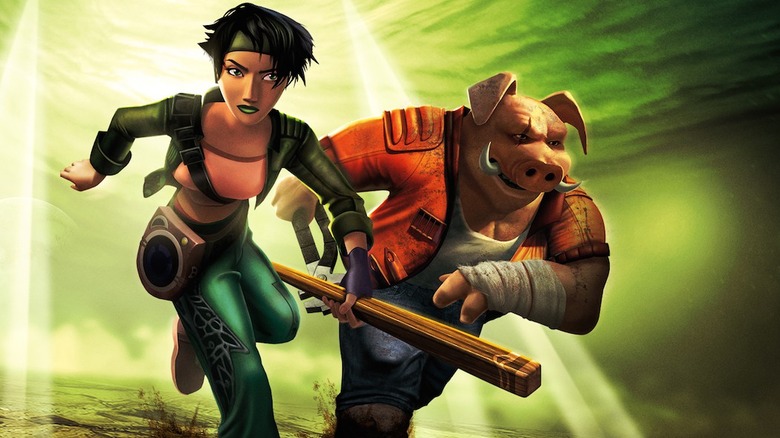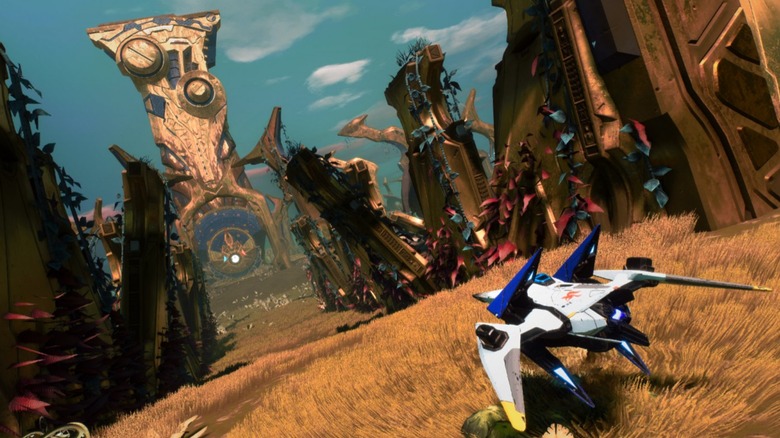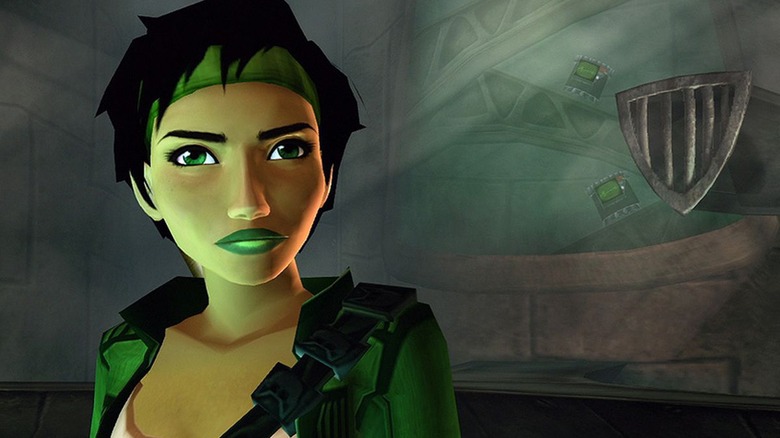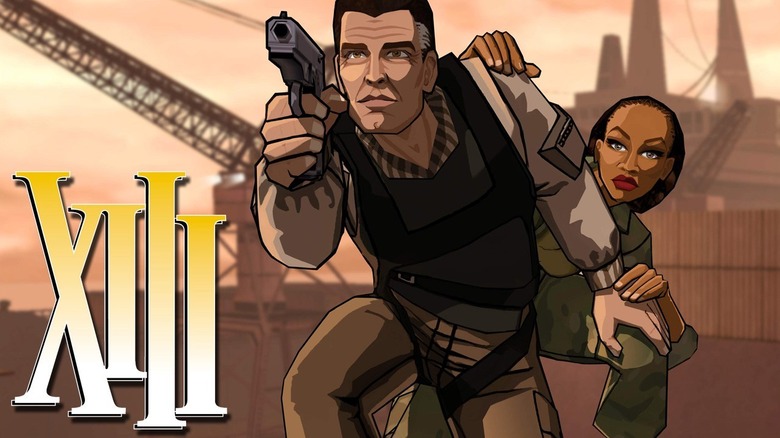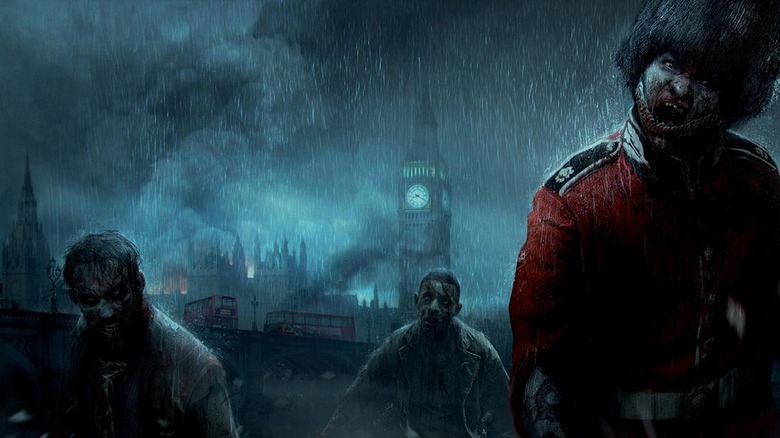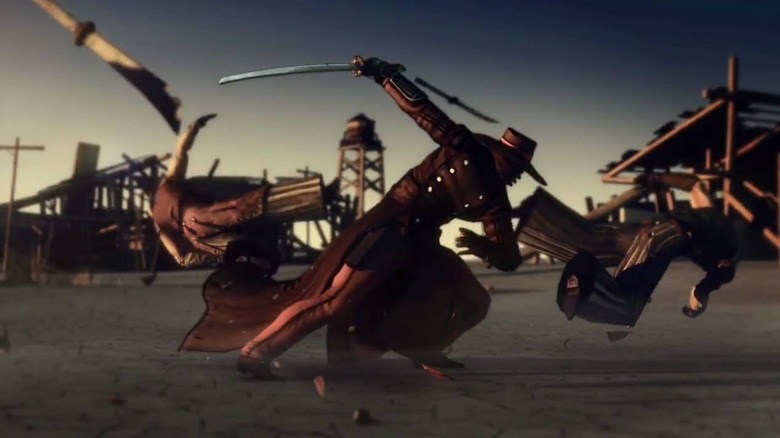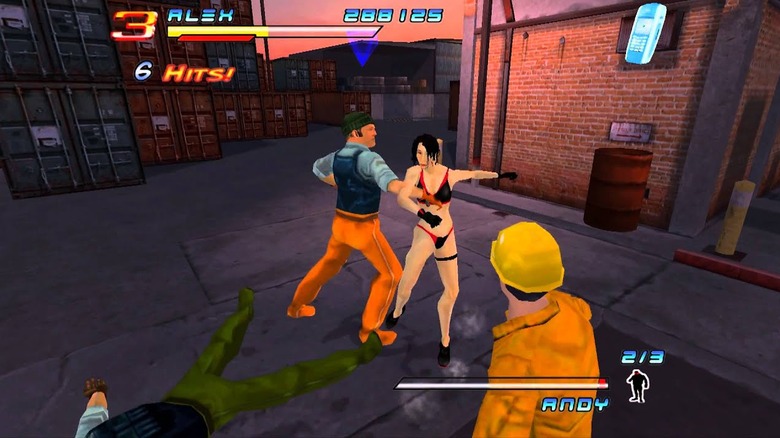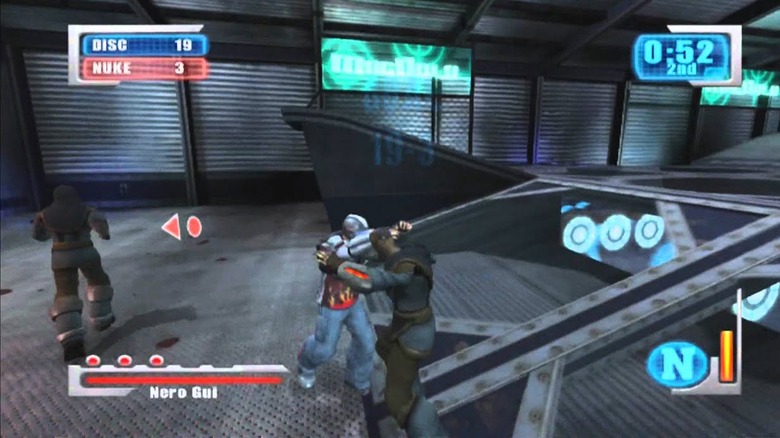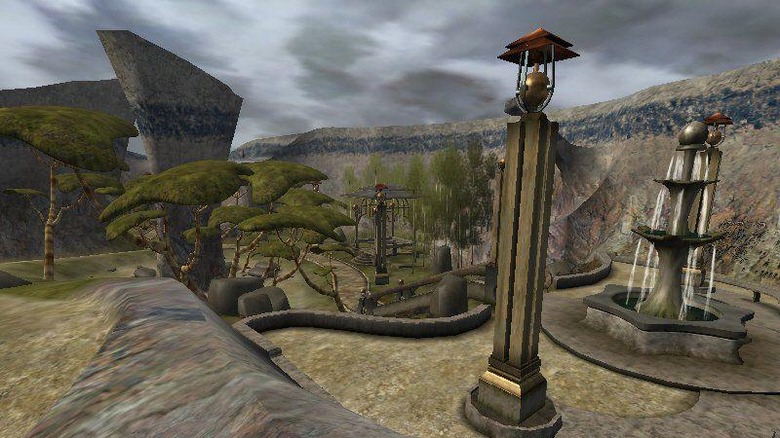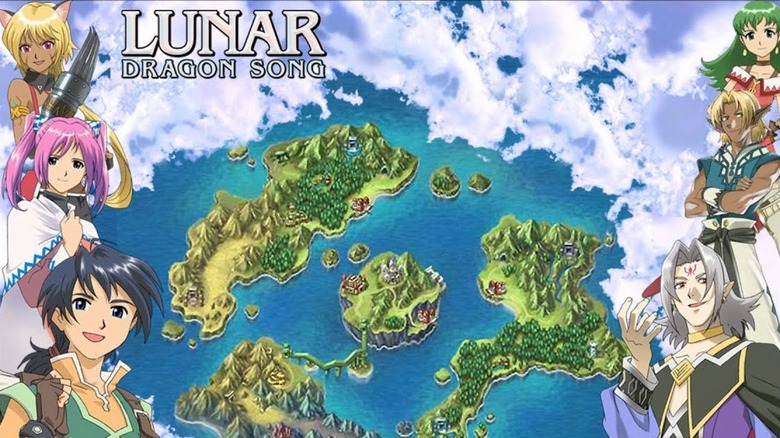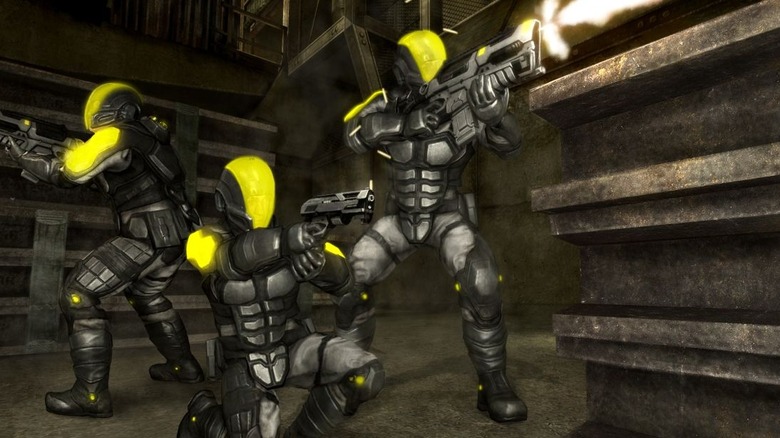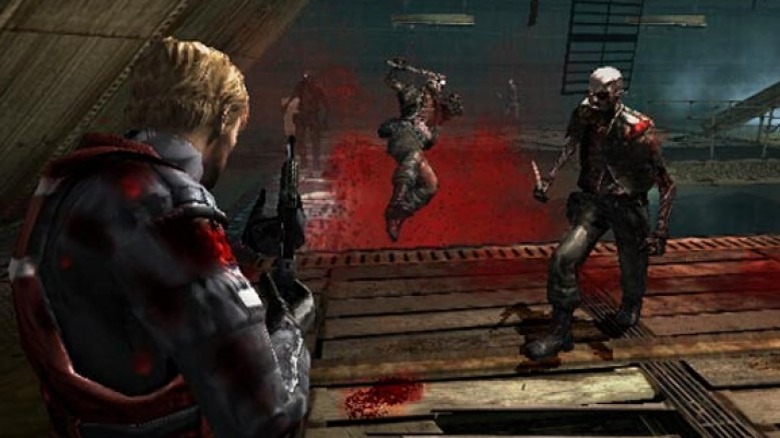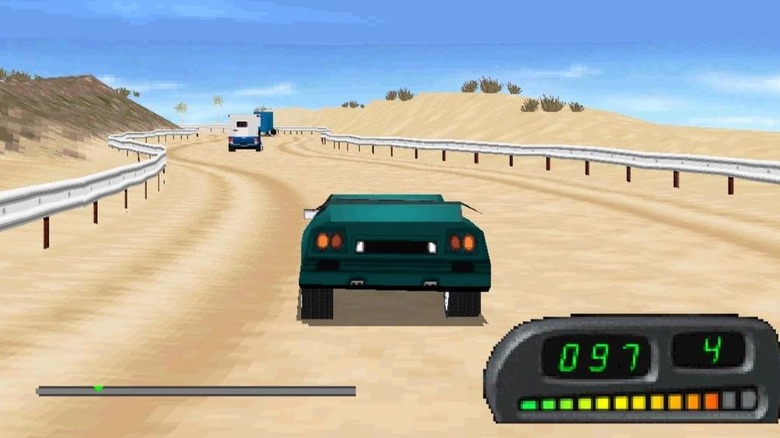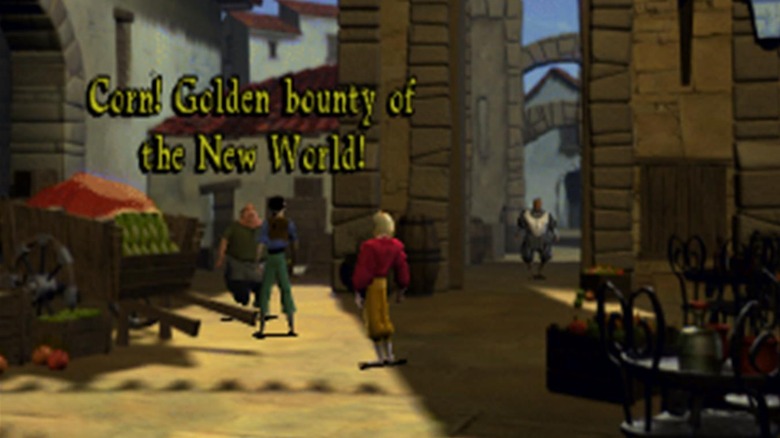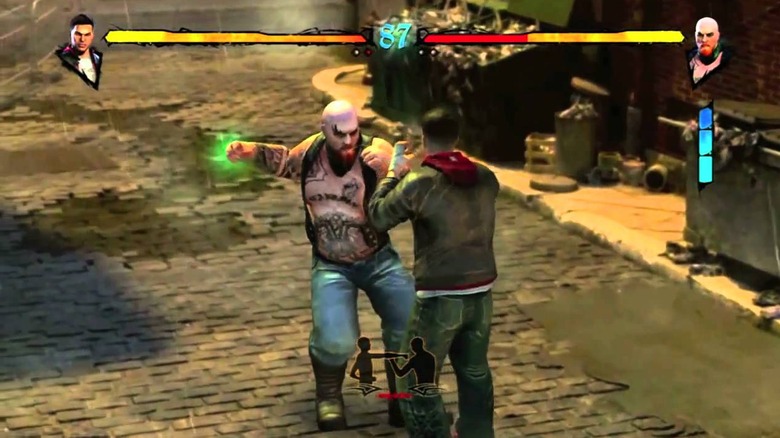Ubisoft Games That Totally Flopped Hard
French video game publisher and developer Ubisoft is one of the most instantly recognizable names in the industry. With studios situated around the globe and such classic series to their name as Assassin's Creed and Prince of Persia, it's sometimes easy to forget that not all of their games have been winners.
The games on this list are some of Ubisoft's greatest missteps. Some of them were simply marketed improperly and failed to find their intended audience, while others are genuine garbage, quick tie-ins meant to cash in on a new intellectual property. A few of these are actually embarrassing blemishes on the Ubisoft brand, while at least one of them is a recognized classic that simply didn't get its due at the time of its release. Not all flops are created equal, so let's take a look at some of Ubisoft's biggest and figure out exactly what it is that sets them apart from the publishing giant's usual output.
Starlink: Battle for Atlas
Starlink: Battle for Atlas was a rather daring move on Ubisoft's part. It was meant to be a game that incorporated an entire toy line, much like Skylanders or Disney Infinity. These "toys-to-life" games encouraged players to buy physical figurines that could then be used in the video game through the game's special interface. In the case of Starlink, players purchased toy ships which attached to a special controller mount. These ships could then be upgraded in-game with different real-life attachments. It was a really cool spin on the toys-to-life concept that also got into the kind of customization that RPG gamers tend to go gaga over.
Unfortunately, the toys sold well below expectations. As noted by USgamer, "A whole [Starlink] set could cost as much as $280," which may have given some parents cold feet about investing in yet another toy-based game, especially after Disney Infinity ended. While Ubisoft did say that Starlink's future weapons and ships would continue to be sold digitally, the low sales of the psychical toys basically killed the original concept of the game.
Beyond Good & Evil
Beyond Good & Evil is probably the most famous flop in the Ubisoft catalogue and an unfortunate victim of terrible marketing. The action-adventure game was beloved by critics and fans, but failed to sell well during its initial release. However, it went on to be a cult classic.
Since then, Ubisoft have been pretty honest about why it failed. Ubisoft's Jay Cohen once explained to GameSpot UK, "We didn't push it. We didn't go deep and try and go as far with the marketing campaign ... the idea was to see the strength of the game community ... and the people who went and bought the game went and grabbed it, but it didn't sell like gangbusters."
Fans of the game were ecstatic when development of Beyond Good & Evil 2 was officially announced in 2016, over a decade after the release of the first installment. Though Beyond Good & Evil 2 didn't make an appearance at 2019's E3, fans have been assured by Ubisoft that this is due to their efforts in "focusing on core development milestones." Basically, it appears that Ubisoft is hoping to make BG&E2 the follow-up that fans deserve.
XIII
Based on a Belgian comic book series of the same name, XIII was a fun, violent, cel-shaded FPS with decent stealth mechanics and solid combat. It also completely embraced the visual style of the comics, complete with a bright color palette and word balloons on the screen. Unfortunately, while XIII received pretty decent reviews (though IGN did criticize the game's weak enemy AI), it failed to meet sales expectations.
When XIII did finally get a follow-up of sorts, it came in the form of XIII: Covert Identity, a side-scrolling mobile game that attempted to reboot the series from scratch and take it in a new, somewhat stripped-down direction. That alone shows a lack of confidence in continuing the story of a game that not very many people picked up. When another XIII video game adaptation arrived in 2011, XIII: Lost Identity, it was likewise a new take on the property, adopting interactive storytelling elements and eschewing the shooter mechanics of the 2003 game.
On the plus side, as of Nov. 13, 2019, PlayStation gamers will be able to enjoy a remake of the 2003 game. Maybe that one will do well enough for a sequel.
ZombiU
ZombiU was another case of an okay game that unfortunately wasn't able to find its audience, seemingly due to its status as a Wii U exclusive release. Destructoid praised the game, while acknowledging the fact that "ZombiU will be viewed through a very particular lens, one designed to scrutinize the Wii U's worth as a 'hardcore' gaming system," rather than on its own merits as a solid survival horror title. The game underperformed, leading to a sequel being canceled while still in the prototype phase. It's a shame, because the sequel aimed to expand on its predecessor in interesting ways, with multiple routes through the various stages and co-op gameplay for team-based zombie smashing.
It may be that the game's exclusivity to the Wii U was its downfall in the sales charts. On the plus side, ZombiU's unprofitability is what convinced Ubisoft to make Rayman Legends a multiplatform release, holding its release until they could make ports for the other platforms, which in turn led to more people being able to play that game. Still, it's one thing for a game to fail, but it's rough when a game fails so hard that it delays the release of another, unrelated game.
Red Steel 2
The Red Steel franchise honestly seemed like it should have performed much better than it ultimately did. A mix of Western aesthetics and samurai-style swordplay sounds perfectly awesome, but the final product just didn't click with audiences. The first game in the series received some middling reviews, but managed to sell pretty well. Naturally, a sequel was produced a few years later.
While 2010's Red Steel 2 was seen as an improvement over its predecessor, it ultimately did not sell as well, which Kotaku noted seemed to be part of a "trend of poor numbers for Wii games that were made to appeal to fans of more violent action-oriented games."
When asked about the future of the Red Steel franchise, Red Steel 2 director Jason Vandenberghe acknowledged the game's lackluster sales performance: "We need to understand if we even have an audience" before starting development on a third game. Though there were rumors of a third game as far back as the fall of 2010, it has yet to materialize.
Charlie's Angels
This game's badness has almost attained a mythical quality. Based on the 2003 film reboot of the 1970s television series, it appears as though the game's entire budget went to its voice cast, as Drew Barrymore, Lucy Liu, and Cameron Diaz reprise their roles as the titular Angels in this worthless adaptation.
The graphics are appalling, with character animations clipping through walls and one another. The combat is clunky button-mashing nonsense, with the Angels hobbling toward the finish line of each stage in skimpy outfits and with barely-defined objectives. The AV Club's Alex McLevy probably summed it up best in his look back at the game: "The failure of this woebegone Charlie's Angels adaptation draws as much from an inability to recognize the value of its source material as it does the unsurprising rotten execution of video game basics."
However, maybe the most incredible aspect of this game's badness comes from a glitch that causes the game's first few stages to loop indefinitely, as though stuck in a demo mode, if you don't have a memory card inserted. In other words, its badness could potentially last forever.
Deathrow
2002's Deathrow was a bizarre little title: a sports game with melee combat, complete with opposing teams with different skills and attributes. Oh, and it took place a few hundred years from now, in a dystopian future, so sometimes your opponents were gnarly cyborgs. It feels like the recipe for a cult classic along the lines of Mutant League Football. The reviews were even pretty decent, with IGN remarking on the game's relatively quiet marketing, saying, "For a game that's gotten little press, this could be a sleeper hit."
Unfortunately, low sales meant that Deathrow was destined to be more "sleeper" than "hit." While Deathrow's developers were interested in making a follow-up, it was reported in 2004 that the game's sales meant there was basically no chance that it would see a sequel. It's a shame, considering the game's mixture of sports and fighting gameplay might make a new installment fairly popular in today's competitive scene. Instead, Deathrow was sentenced to the bargain bins.
Uru: Ages Beyond Myst
Uru: Ages Beyond Myst was always meant to be something of a departure, but its differences from previous Myst games may have ended up spelling its doom. While mind-melting puzzles were always a staple of the Myst series, some critics felt that the game's control scheme made Uru's puzzles more frustrating than challenging, with GameSpy remarking, "Far too much of the game is spent worrying over the controls instead of enjoying the puzzles and atmosphere."
Beyond that, the game fell short of its original lofty goals of being a continuously updated online experience. As explained by Eurogamer, Myst developers Cyan Worlds had begun developing Uru for Ubisoft (in those days a smaller publisher than they are now) because they were "pushing online as the new frontier of gaming." Sadly, many of Cyan Worlds' plans had to be jettisoned when "Ubisoft decided to move away from online gaming," with the resulting game failing to reach the heights of its predecessors.
Following the commercial failure of Uru, Cyan Worlds laid off the majority of its staff and announced the more conventional sequel, Myst 5: End of Ages, as the final chapter in the core series.
Lunar: Dragon Song
While the Lunar series definitely has a fanbase, Lunar: Dragon Song tends to be recognized as a major misstep in the franchise. The RPG sold less than 25,000 copies during its initial release in Japan, which should have already been a red flag before it arrived in the rest of the world. When Lunar released in North America, the reviews were savage. Eurogamer criticized the gameplay, saying, "The battle system is comfortably the worst in 20 years of RPGs." Basically, this game features turn-based fighting that doesn't even allow you to pick your targets. You literally just have to hope you wear down the enemies (or, if you're particularly bored, you can turn on an "automatic" option that slowly does the fighting for you).
In addition to that, it has been noted that the English translation for Dragon Song was very poor. Still, that doesn't account for the weak story, which IGN noted lacks "the charm or cohesive storytelling of the past games." All in all, it seems as though Dragon Song was a let down for fans and uninteresting to the uninitiated.
Haze
Haze was more than a financial failure: it also fell victim to all of the extraordinarily high expectations that were placed upon it leading up to its release, which led to it feeling entirely underwhelming upon its debut. During the game's development, it was positioned as a "Halo killer," destined to unseat the then-king of console shooters. Haze had lofty goals and a lot of ideas; it just unfortunately didn't see any of them through in any particularly impressive ways. This included its mixed messages of peace. As HeadStuff points out, "Haze was supposedly designed as an anti-war game which makes about as much sense as saying Burnout warned against dangerous driving." Its marketing campaign also included a trailer which spoiled major plot developments.
The game was delayed numerous times as the developers at Free Radical worked on adding more features at the behest of Ubisoft. Haze was released as a PlayStation 3 exclusive (essentially missing all of those Halo players it was supposedly meant to sway) and underperformed with audiences and critics alike. The long development and disappointing returns on Haze also sadly led to the closure of Free Radical.
Cold Fear
Cold Fear's greatest weakness may just be how uninspired the whole things feels. Even in a mostly fond look back at the game, Bloody Disgusting said, "There's a lot of shooting in here, and though it's not excellent, it's not bad, either," which is kind of the best way to sum up the game as a whole. It's perfectly serviceable, if not exactly original or memorable. It's not that it's a bad game, it just feels very much like a Resident Evil wannabe with a dusting of snow.
Maybe the most surprising thing about Cold Fear is that, at one point, there was a film adaptation in development from Avatar Films and Sekretagent Productions. What isn't surprising is that the film has yet to materialize since being announced in 2006. After all, in it's first year of release, Cold Fear sold less than 70,000 copies total across all platforms in the US. Those aren't exactly the kind of numbers that would convince a film studio — even indie studios like Avatar and Sekretagent — that they had a blockbuster on their hands.
Hooters: Road Trip
Why, yes. That Hooters. There was a PlayStation racing title that tied in with the restaurant chain that was somehow less fun that eating the food at Hooters. After playing though hideous-looking races with poor controls, players were rewarded with brief, stuttering FMV clips of Hooters Girls celebrating your victory and getting you hyped for the next round. The next round never came, though, because anyone unlucky enough to play through a lap of Hooters: Road Trip hopefully threw this game right in the trash and picked up literally any other racing game instead.
Perhaps the most damning evidence in the case against Road Trip is that the company that developed it, Hoplite Research (which sounds more like a front for the evil lab from Stranger Things than a game developer) doesn't seem to have left much of a trail online. As Den of Geek hilariously put it, "Considering that we can't seem to find much information on this studio, we assume that they were only named Hoplite Research because someone had the foresight to not put 'tax shell corporation' on the letterhead."
Gold and Glory: The Road to El Dorado
Though Dreamworks' The Road to El Dorado was a flop at the box office, it has gone on to become something of a cult classic. More modern reviews have made the argument that the movie may have been underrated. In fact, GameSpot's review for Gold & Glory: The Road to El Dorado, the movie's video game adaptation, specifically praises the footage from the film that is used in the cutscenes. Naturally, it does this while pointing out that the game itself is hot garbage: "The short [animated] sequences don't make up for a game that is so riddled with glitches, that it's downright unplayable."
This negative review wasn't an isolated incident, either. Critics have not been kind to Gold & Glory, specifically taking issue with the game's weak puzzles and the story's overall short length. It's not a surprise that a game based on an underperforming film also did poorly. However, Gold & Glory clearly wasn't made with the same kind of care that went into the movie, which still has its fans.
Fighters Uncaged
Fighters Uncaged was a launch title for the Kinect, a fighting game that (in theory) allowed players the feeling of real bare-knuckled combat without all of the pesky scratches and bruises that usually go along with that. Unfortunately, the execution left quite a bit to be desired.
The story is bare bones, with GameSpot pointing out, "Aside from a mention in the manual and a short cinematic intro, you hear nothing about the story once you start playing, which makes this setup completely unnecessary." However, thin stories are nothing new in fighting games.
The real issues came from how buggy and unresponsive the game was, with many of the movements not registering in the way they should. IGN described trying to get the game to work as "a series of desperate flails, trying to get the game to recognize your actions." Beyond the bad reviews, Fighters Uncaged was also the subject of a lawsuit from the Ultimate Fighting Championship, with UFC taking particular issue with Ubisoft's use of the phrase "Ultimate Fighter" in advertising for the game. All in all, Fighters Uncaged was worse for Ubisoft (and players) than being caught in a real back alley brawl.

